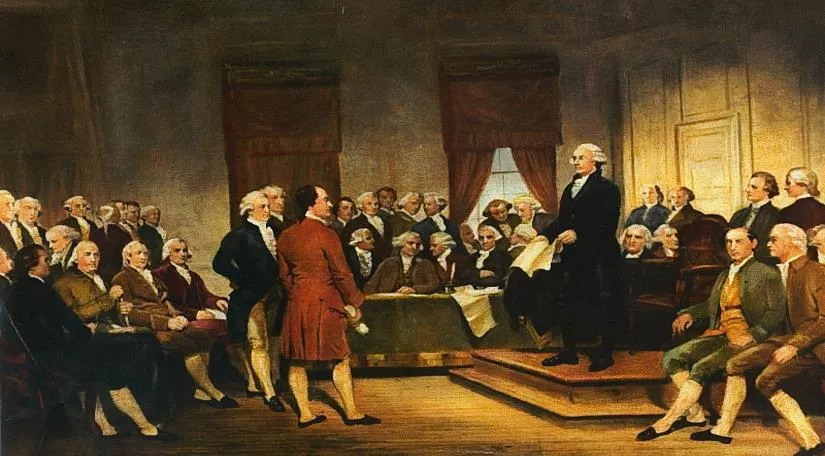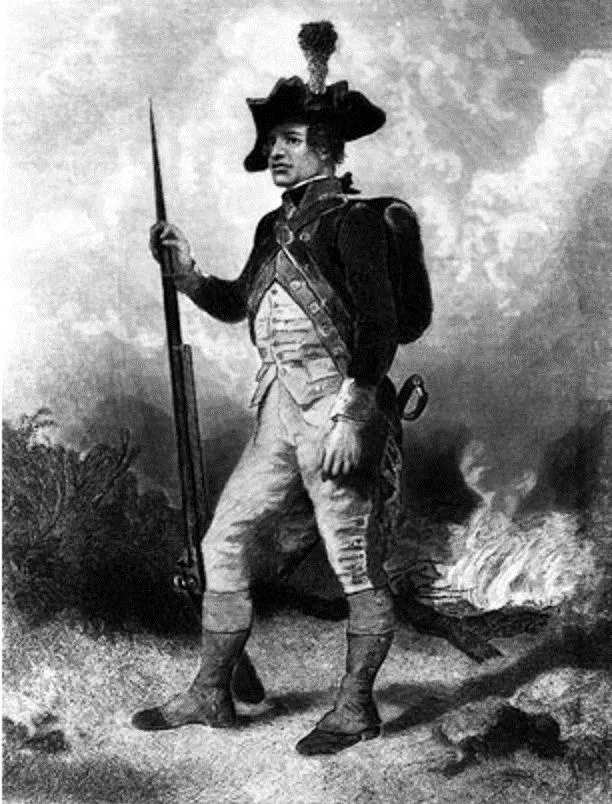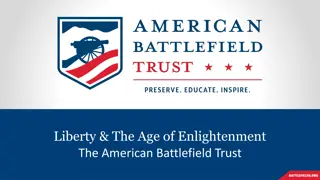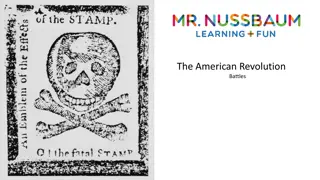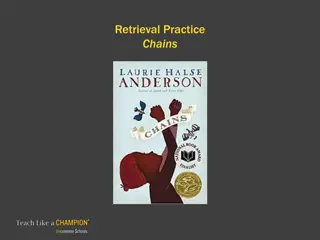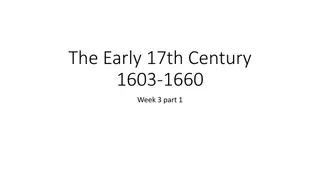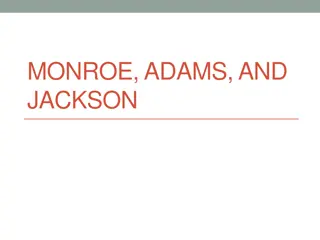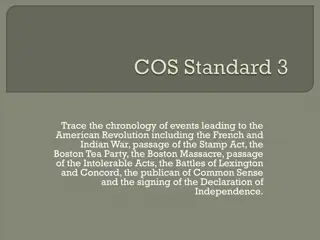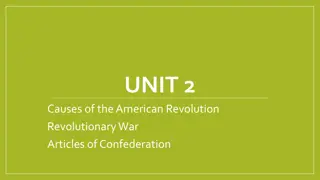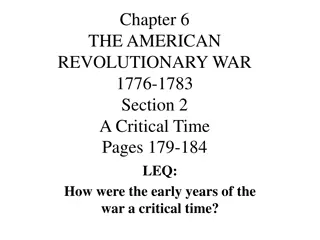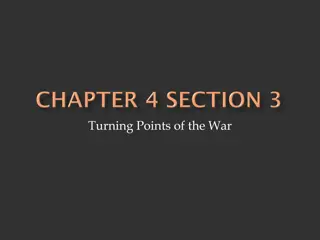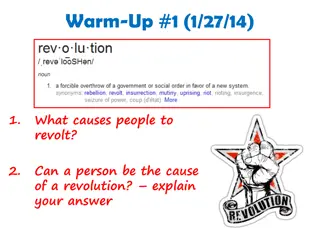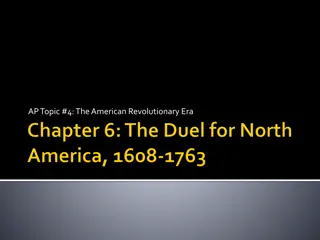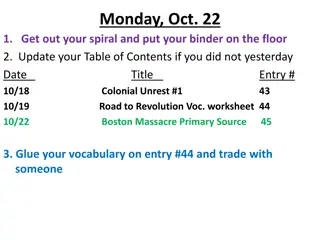American Revolutionary Era: Key Events and Figures
The American Revolutionary Era marked by the formation of the Constitution, Washington's militia, key figures like Jonathan Trumbull and John Peter Muhlenberg, the emergence of American culture, the Articles of Confederation, and calls for a stronger government. This period saw a shift towards a more united American identity, paving the way for significant political and cultural developments.
Download Presentation

Please find below an Image/Link to download the presentation.
The content on the website is provided AS IS for your information and personal use only. It may not be sold, licensed, or shared on other websites without obtaining consent from the author.If you encounter any issues during the download, it is possible that the publisher has removed the file from their server.
You are allowed to download the files provided on this website for personal or commercial use, subject to the condition that they are used lawfully. All files are the property of their respective owners.
The content on the website is provided AS IS for your information and personal use only. It may not be sold, licensed, or shared on other websites without obtaining consent from the author.
E N D
Presentation Transcript
http://a.abcnews.go.com/images/News/gty_us_constitution_jef_111215_wblog.jpghttp://a.abcnews.go.com/images/News/gty_us_constitution_jef_111215_wblog.jpg Chapter 4 Foundations: Background to American History http://upload.wikimedia.org/wikipedia/commons/2/29/Washington_Constitutional_Convention_1787.jpg
Washingtons Militia & Army Militiamen served as home guard and as supplement to the Continental Army The Continental Army was by contrast trained and more reliable None were battle- harden & ready to see the horror of war Continental soldier
During the Revolution 1775-1783 http://cdn2-b.examiner.com/sites/default/files/styles/image_content_width/hash/5b/3d/5b3d2bcdea77442f6bdfe63203e33bbf.jpg?itok=9EQjsoMW Jonathan Trumbull was the only British Governor that sided with the Americans John Peter Muhlenberg was a Protestant minister who recruited soldiers and rose to the rank of general
The Emergence of an American Culture The Revolution helped excite a sense of common nationality Celebration of Independence Day The American Consciousness and the idea of America s Destiny Signers of the D. Of I. John Hancock, Ben Rush, Charles Carroll, & John Witherspoon
The Articles of Confederation The period between 1781- 1787 was a critical period During this period the national government was weak for fear of a British- like central government The Confederation Congress dealt with the westward land distribution and it established three executive departments: Foreign Affairs, Finance, & War Dickinson & the Articles of Confederation
Calls for a Stronger Government Americans were losing their fear of a strong central government Bankers, Merchants, and Mechanics now called for strong gov. James Madison called for a meeting in 1786 but not all the states came Alexander Hamilton called for a national convention the next year James Madison
Adopting the Constitution The delegates who met included many participants from the Revolution James Madison & The Virginia Plan New Jersey Plan Roger Sherman & The Great Compromise Signing the Constitution, September 17, 1787
Other Battles at the Convention The battle between the Northern & Southern delegates over slavery 3/5 compromise Women s rights left out of constitution In regard to citizenship it gave Congress authority over naturalization American Indians would not be given citizenship until 1924
The Separation of Powers The Founding Fathers viewed the House as the most democratic The Senate would be chosen by the state legislatures The President could veto acts of Congress, appoint diplomats & judges, recommend legislation to Congress, & act as commander-in-chief of the armed forces
Checks & Balances The Separation of the three branches of gov. The President s veto The congressional power of impeachment The Courts right of judicial review The Senate s power to approve or reject treaties & appointments Amendments
Checks & Balances The Separation of the three branches of gov. The President s veto The congressional power of impeachment The Courts right of judicial review The Senate s power to approve or reject treaties & appointments Amendments
The First Supreme Court The Congress setup the structure of the federal court system Congress set the number on the high court a six and created thirteen federal district courts Members of the Supreme Court were required to serve on circuit courts as well The First Chief Justice John Jay
The Bill of Rights B/C MA, NY, VA, & NC had all requested a bill of rights James Madison wrote a list of amendments and presented them to congress in 1789 In the late 1700s the US was alone in the world b/c the constitution prevents Congress from establishing an official religion The 10th Amendment said that powers not given to the national Gov. remained w/ the states or the people James Madison
Freedom of Religion One of the 1st Amendment Rights is religion The Anglican Church suffered b/c of its association with the British, it changed its name to the Episcopal Church The Methodist, Baptist, & Presbyterian churches grew bigger Thomas Jefferson wrote the Virginia Statue of Religious Freedom We also got freedom of speech, press, and assembly in the 1st amendment Jefferson & the Virginia Statue
More Amendments 2nd Amendment the right to bear arms 3rd Amendment we don t have to quarter soldiers 4th Amendment we are protected from unreasonable searches 5th Amendment protects us from double jeopardy, from incriminate yourself, and gives the government eminent domain. http://a.abcnews.go.com/images/News/gty_us_constitution_jef_111215_wblog.jpg
More Amendments 6th Amendment - right to public trail, jury, & lawyer 7th Amendment right to jury in some civil cases 8th Amendment court can t inflict cruel and unusual punishment 9thlist rights but doesn t deny other rights 10th gives power to the states if not in the constitution http://a.abcnews.go.com/images/News/gty_us_constitution_jef_111215_wblog.jpg
Alexis de Tocqueville A French man that visited the United States in 1831 believed America was great b/c of five values: Liberty freedom, rule of law, and religious faith Egalitarianism we are a society of equals Individualism we are free to flourish w/o government Populism common man free to participate in politics Laissez-faire gov. has a hands-off approach to the economy http://www.biografiasyvidas.com/biografia/t/fotos/tocqueville.jpg



